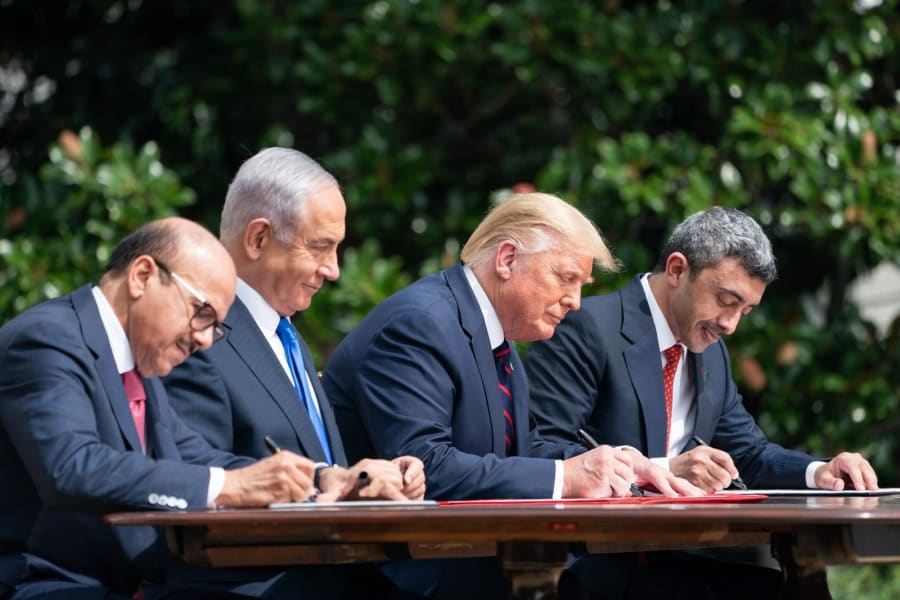New rules, clear foreign policy strategy responsible for Trump peace accords
Administration's approach to Middle East based on new insight: Peace without Palestinians is possible

The peace deals brokered by the United States between Israel and two Gulf States in the past month represent a clear strategy by the Trump administration — one that has thrown out the old rule book on Middle East peace and is now starting to enjoy historic successes.
U.S. President Donald Trump’s foreign policy strategy, the Middle East Strategic Alliance (MESA), flies in the face of the traditional American approach to the Israeli-Palestinian conflict.
In 2016, former U.S. Secretary of State John Kerry stated the long-held conventional wisdom: “There will be no separate peace between Israel and the Arab world.”
"לא יהיה שלום נפרד בין ישראל לעולם הערבי. אני רוצה שזה יהיה ברור מאוד לכולכם... לא, לא, לא ולא... לא יהיה בלי תהליך עם הפלסטינים". עוד אחד שטעה... ג'והן קרי בפורום סבן ב-2016. מרתק. pic.twitter.com/ZNQt2e0mTv
— Udi Evental (@UEvental) September 16, 2020
“I’ve heard several prominent politicians in Israel sometimes saying, ‘Well the Arab world is in a different place now. We just have to reach out to them and we can work some things with the Arab world and we’ll deal with the Palestinians.’ No, no, no and no,” Kerry said emphatically at the Brookings Institute Saban Forum in 2016. “There will be no advanced and separate peace with the Arab world without the Palestinian process and Palestinian peace.”
Kerry was speaking from experience and reiterating the typical American foreign policy approach which involved negotiating a compromise between the Israelis and the Palestinians. But the current administration’s intentional break from this conventional wisdom seems to be the very reason for its success.
“The president made a decision from the moment he came into office that he wasn’t going to do things the same old way,” Vice President Mike Pence told All Israel News in an exclusive White House interview the day of the history Abraham Accords signing. “He wasn’t going to keep rewarding Palestinian refusals to negotiate. He wasn’t going to keep giving them financial support for that.”
Trump’s foreign policy in the Middle East involves a three-prong, long-term strategy. The first step was to isolate Iran. He withdrew the U.S. from the 2015 nuclear deal and began shoring up relationships with nations who also view Iran as a common enemy.
The second step was to offer the Palestinians the “deal of the century.” He did, but the package was roundly rejected by Palestinians who felt the political and economic package heavily favored Israel.
Finally, with no one left to negotiate with on the Palestinian side, Trump focused on the broader Middle East through MESA and pursued deals involving Israel — without the Palestinians. The Abraham Accords are the manifestation of several years of diplomatic investment in the region.
“Since 2017, administration officials have been working quietly with their counterparts in places like Saudi Arabia, Oman, Qatar, Bahrain, Kuwait, the UAE and Jordan to build a regional security grouping aimed at ‘confront[ing] extremism, terrorism, [and] achieving peace, stability and development’ in the region,” according to Ilan Berman, senior vice president of the American Foreign Policy Council and expert on regional security in the Middle East.
Pence noted that the president’s first trip overseas was to Saudi Arabia where he met with the leaders of 50 Muslim countries. That visit was a strategic decision and made clear that advancing Middle East peace was a top priority for the administration right from the beginning, Pence said.
The Abraham Accords signed on Sept. 15 are beckoning to even more nations for their benefits in commerce, security and scientific and medical cooperation. Trump said he expected five to six more countries “to come in” rather quickly.
The question is whether Democrats and the mainstream media will give Trump credit for these agreements.
“While the Israeli media are gracious enough to give (Israeli Prime Minister Benjamin) Netanyahu at least some credit where credit is due, the corporate media in the United States have refused to give President Trump and his team any credit for this historic achievement and like to criticize Trump’s foreign policies as chaotic, inconsistent, and isolationist," Helen Raleigh noted in The Federalist.
Where previous U.S. administrations had failed "in an attempt to bring peace in the Middle East, repeating the same conventional approaches and getting the same failure in return" Trump has succeeded, Raleigh wrote.
"It is obvious that the media simply can’t bring themselves to admit (that) Trump’s unconventional approach is working," she concluded.

Nicole Jansezian was the news editor and senior correspondent for ALL ISRAEL NEWS.













